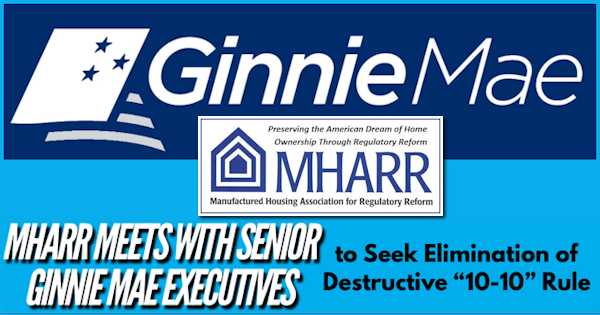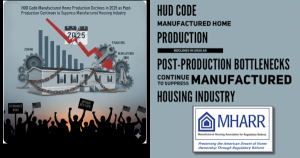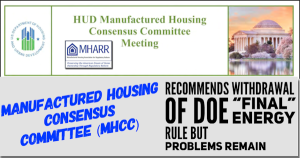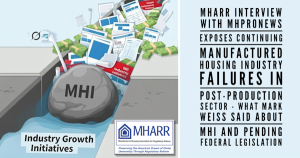MHARR Meets with Senior Ginnie Mae Executives to Seek Elimination of Destructive “10-10” Rule

MHARR representatives met with senior-level officials of the Government National Mortgage Association (Ginnie Mae), including Acting Executive Vice President Michael Drayne, on February 10, 2022. The meeting was arranged to address MHARR’s request to newly-confirmed Ginnie Mae President Alanna McCargo, to either repeal or reform the Ginnie Mae “10-10” rule for lender participation in the Federal Housing Administration’s (FHA) Title I manufactured housing program. For more than a decade, the “10-10” rule has severely restricted utilization of the Title I program for manufactured home personal property (i.e., chattel loans). As a result, the Title I program which, at one time, accounted for thousands of manufactured home purchase loan originations annually, today has virtually non-existent origination levels.
During the meeting, MHARR’s representatives methodically addressed the failure of the “10-10” rule and its destructive impact on the manufactured housing consumer financing market, particularly in combination with the corresponding failure and refusal of Fannie Mae and Freddie Mac to implement the statutory Duty to Serve Underserved Markets (DTS) mandate with respect to the personal property loans which account for nearly 80% of mainstream HUD Code manufactured home consumer lending. The continuing failure to fully and properly implement both of these programs, has denied millions of lower and moderate-income American families full access to all the benefits of inherently affordable, non-subsidized manufactured housing by, among other things, limiting market participation and market entry by significant numbers of new, smaller lenders, and by helping to sustain the higher interest rates charged by the handful of lenders that currently dominate that market.
MHARR’s representatives stressed that given President Biden’s stated commitment to supporting the availability of affordable housing for all Americans, as well as housing equity – including equity in home purchase financing – the restrictive “10-10” rule, which benefits just two large finance companies while excluding many others from participation in the FHA Title I program, is a failed policy relic that must be rescinded. Instead, Ginnie Mae should adopt participation parameters that would allow and facilitate the entry and participation of new lenders in the manufactured housing personal property financing market. The broadening of that market, in turn, with healthier and more robust competition, would inevitably produce lower interest rates for such loans, which would enable consumers to qualify for financing who are currently foreclosed from the market. The status quo, conversely, effectively forces consumers into higher-rate loans, contrary to Administration policy and the congressional intent underlying these programs.
The Ginnie Mae officials appeared to be receptive to the concerns raised by MHARR and the need to reinvigorate and revitalize the FHA Title I program for the benefit of lower and moderate-income homebuyers.
MHARR will continue to press for the withdrawal or reform of the highly-detrimental “10-10” rule and will provide updates on this matter as warranted by further developments.
cc: Other Interested HUD Code Manufactured Housing Producers, Retailers, Communities and Finance Companies
Manufactured Housing Association for Regulatory Reform (MHARR)
1331 Pennsylvania Ave N.W., Suite 512
Washington D.C. 20004
Phone: 202/783-4087
Fax: 202/783-4075
Email: MHARR@MHARRPUBLICATIONS.COM
Website: manufacturedhousingassociation.org
MHARR representatives met with senior-level officials of the Government National Mortgage Association (Ginnie Mae), including Acting Executive Vice President Michael Drayne, on February 10, 2022. The meeting was arranged to address MHARR’s request to newly-confirmed Ginnie Mae President Alanna McCargo, to either repeal or reform the Ginnie Mae “10-10” rule for lender participation in the Federal Housing Administration’s (FHA) Title I manufactured housing program. For more than a decade, the “10-10” rule has severely restricted utilization of the Title I program for manufactured home personal property (i.e., chattel loans). As a result, the Title I program which, at one time, accounted for thousands of manufactured home purchase loan originations annually, today has virtually non-existent origination levels.
During the meeting, MHARR’s representatives methodically addressed the failure of the “10-10” rule and its destructive impact on the manufactured housing consumer financing market, particularly in combination with the corresponding failure and refusal of Fannie Mae and Freddie Mac to implement the statutory Duty to Serve Underserved Markets (DTS) mandate with respect to the personal property loans which account for nearly 80% of mainstream HUD Code manufactured home consumer lending. The continuing failure to fully and properly implement both of these programs, has denied millions of lower and moderate-income American families full access to all the benefits of inherently affordable, non-subsidized manufactured housing by, among other things, limiting market participation and market entry by significant numbers of new, smaller lenders, and by helping to sustain the higher interest rates charged by the handful of lenders that currently dominate that market.
MHARR’s representatives stressed that given President Biden’s stated commitment to supporting the availability of affordable housing for all Americans, as well as housing equity – including equity in home purchase financing – the restrictive “10-10” rule, which benefits just two large finance companies while excluding many others from participation in the FHA Title I program, is a failed policy relic that must be rescinded. Instead, Ginnie Mae should adopt participation parameters that would allow and facilitate the entry and participation of new lenders in the manufactured housing personal property financing market. The broadening of that market, in turn, with healthier and more robust competition, would inevitably produce lower interest rates for such loans, which would enable consumers to qualify for financing who are currently foreclosed from the market. The status quo, conversely, effectively forces consumers into higher-rate loans, contrary to Administration policy and the congressional intent underlying these programs.
The Ginnie Mae officials appeared to be receptive to the concerns raised by MHARR and the need to reinvigorate and revitalize the FHA Title I program for the benefit of lower and moderate-income homebuyers.
MHARR will continue to press for the withdrawal or reform of the highly-detrimental “10-10” rule and will provide updates on this matter as warranted by further developments.
cc: Other Interested HUD Code Manufactured Housing Producers, Retailers, Communities and Finance Companies
Manufactured Housing Association for Regulatory Reform (MHARR)
1331 Pennsylvania Ave N.W., Suite 512
Washington D.C. 20004
Phone: 202/783-4087
Fax: 202/783-4075
Email: MHARR@MHARRPUBLICATIONS.COM
Website: manufacturedhousingassociation.org












